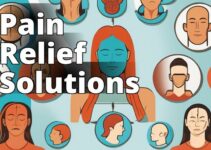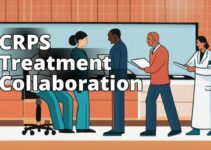What You Will Learn About Managing Postherpetic Neuralgia Pain
- Definition and impact of postherpetic neuralgia on daily life.
- Treatment options, including medications and alternative therapies.
- Lifestyle changes, preventive measures, support resources, and expert insights for effective pain management.
What is the most effective way to manage postherpetic neuralgia pain? This ultimate guide aims to provide comprehensive insights into managing postherpetic neuralgia (PHN) pain effectively. We will explore the impact of PHN on daily life, the importance of pain management, and various strategies for coping with this condition.
Understanding Postherpetic Neuralgia (PHN)
What is postherpetic neuralgia?
Postherpetic neuralgia is a form of chronic pain that occurs as a complication of shingles, a viral infection caused by the varicella-zoster virus. It develops when damaged nerve fibers send exaggerated pain signals to the brain, leading to persistent and often excruciating pain in the affected area.
Causes and risk factors
The primary cause of postherpetic neuralgia is the reactivation of the varicella-zoster virus, which remains dormant in the body after an initial chickenpox infection. Advanced age, a weakened immune system, and severe shingles outbreaks increase the risk of developing PHN.
Symptoms and their impact on daily life
The hallmark symptom of postherpetic neuralgia is severe, stabbing, or burning pain in the areas where the shingles rash occurred. This relentless pain can significantly impact daily activities, sleep, and emotional well-being, leading to a diminished quality of life for affected individuals.
The association between postherpetic neuralgia and pain
Postherpetic neuralgia is intricately linked to the experience of persistent and often debilitating pain. Understanding the nature of this pain and its impact is crucial for developing effective management strategies.
Diagnosis and Treatment Options
The diagnostic process for postherpetic neuralgia
Diagnosing postherpetic neuralgia involves a thorough medical history review, physical examination, and assessment of the characteristic pain symptoms. Healthcare providers may also perform additional tests to rule out other potential causes of the pain.
Medications commonly used for pain management
1. Anticonvulsants
Anticonvulsant medications such as gabapentin and pregabalin are commonly prescribed to alleviate nerve pain associated with postherpetic neuralgia. These drugs work by stabilizing abnormal electrical activity in the nervous system, reducing the intensity of pain signals.
2. Topical agents
Topical medications like lidocaine patches can provide localized pain relief by numbing the affected area and interrupting nerve signals.
3. Opioids
In some cases, opioids may be considered for managing severe postherpetic neuralgia pain. However, their use is often limited due to the potential for addiction and other adverse effects.
Other treatment options for pain management
1. Nerve blocks
Nerve blocks involve the injection of anesthetic or steroid medications near affected nerves to temporarily interrupt pain signals, providing relief for some individuals.
2. Physical therapy and occupational therapy
Engaging in physical and occupational therapy can help individuals with postherpetic neuralgia improve physical function, alleviate pain, and enhance overall well-being.
Emerging treatments and therapies specifically targeting pain relief
Research into innovative treatments such as transcutaneous electrical nerve stimulation (TENS), which uses low-voltage electrical currents to relieve pain, shows promise in managing postherpetic neuralgia pain.
Lifestyle Changes and Pain Management Strategies
The role of exercise and physical activity in managing postherpetic neuralgia pain
Regular physical activity, tailored to individual capabilities, can improve physical function, alleviate pain, and enhance overall well-being for individuals with postherpetic neuralgia.
Dietary considerations for pain management
Maintaining a healthy, balanced diet rich in anti-inflammatory foods and essential nutrients can support overall health and potentially aid in managing postherpetic neuralgia pain.
Stress management techniques for coping with chronic pain associated with postherpetic neuralgia
Practicing stress-reducing techniques such as mindfulness meditation, deep breathing exercises, and relaxation techniques can help individuals cope with the emotional and psychological impact of chronic pain.
| Alternative Therapy | Description |
|---|---|
| Acupuncture | Traditional Chinese practice using thin needles to rebalance energy flow and alleviate pain |
| Acupressure | Application of pressure to specific points on the body to stimulate healing and relieve pain |
| Herbal Remedies | Use of natural herbs and supplements, such as capsaicin cream and alpha-lipoic acid, to manage nerve pain |
| Mind-Body Practices | Engaging in activities like yoga and meditation to promote relaxation and alleviate pain |
Alternative Therapies for Pain Relief
Acupuncture and acupressure for postherpetic neuralgia pain
Some individuals find relief from postherpetic neuralgia pain through acupuncture or acupressure, which are traditional Chinese practices believed to help rebalance the body's energy flow and alleviate pain.
Herbal remedies and supplements for managing nerve pain
Certain herbal remedies and supplements, such as capsaicin cream derived from chili peppers and alpha-lipoic acid, have shown potential in managing nerve pain associated with postherpetic neuralgia.
Mind-body practices such as yoga and meditation for pain management
Engaging in mind-body practices like yoga and meditation can help individuals with postherpetic neuralgia cultivate a sense of relaxation, reduce stress, and potentially alleviate pain.
Support and Resources for Pain Management
Support groups and counseling for individuals managing postherpetic neuralgia pain
Joining support groups or seeking counseling can provide individuals with postherpetic neuralgia the opportunity to connect with others facing similar challenges and access valuable emotional support.
Finding healthcare providers experienced in pain management for postherpetic neuralgia
Seeking out healthcare providers with expertise in pain management and a thorough understanding of postherpetic neuralgia can greatly benefit individuals seeking comprehensive care.
Accessing financial and community resources for comprehensive pain management
Exploring available financial and community resources can help individuals with postherpetic neuralgia access necessary support services, treatments, and community programs.
Preventive Measures and Pain Management
Strategies for preventing postherpetic neuralgia after a shingles outbreak
Prompt administration of antiviral medications and early intervention during a shingles outbreak can help reduce the risk of developing postherpetic neuralgia.
Vaccination and other preventive measures for shingles and subsequent postherpetic neuralgia pain
Receiving the shingles vaccine can significantly reduce the risk of developing shingles and, by extension, postherpetic neuralgia, particularly in older adults.
Case Studies and Personal Experiences with Pain Management
Real-life stories of individuals managing postherpetic neuralgia pain
Personal stories and experiences from individuals managing postherpetic neuralgia pain can provide a more relatable and empathetic perspective, offering practical advice and inspiration for others facing similar challenges.
Insights into how different individuals manage and cope with their pain effectively
Understanding the diverse strategies and coping mechanisms employed by individuals with postherpetic neuralgia can offer practical guidance and inspiration for others.
Personal Experience: Overcoming Postherpetic Neuralgia Pain
Coping with Chronic Pain: Maria's Story
Maria, a 62-year-old retiree, experienced excruciating postherpetic neuralgia (PHN) pain following a severe case of shingles. The pain was so debilitating that it affected her daily activities and quality of life. Despite trying various medications, the pain persisted, leaving her feeling helpless.
Managing Pain Effectively
After consulting with a pain management specialist, Maria incorporated a combination of anticonvulsant medication, regular physical therapy, and stress-relief techniques into her daily routine. Over time, she noticed a significant reduction in her PHN pain, allowing her to regain control over her life and engage in activities she once thought impossible.
The Power of Comprehensive Pain Management
Maria's journey showcases the importance of a holistic approach to managing postherpetic neuralgia pain. By combining medication, therapy, and lifestyle changes, she was able to effectively alleviate her symptoms and improve her overall well-being. Her story serves as an inspiration for others navigating the challenges of PHN pain, emphasizing the potential for a fulfilling life beyond the grasp of chronic pain.
Research, Innovations, and Expert Opinions on Pain Management
Ongoing research into new treatments and therapies for postherpetic neuralgia pain
Continued research efforts are exploring novel treatments and therapeutic approaches aimed at enhancing pain management and quality of life for individuals with postherpetic neuralgia.
Promising developments in pain management for postherpetic neuralgia
Advancements in medical science hold promise for the development of more effective and targeted interventions for managing postherpetic neuralgia pain.
Expert Interviews and Opinions on Pain Management
Insights from healthcare professionals specializing in pain management for postherpetic neuralgia
Gaining insights from healthcare professionals specializing in pain management can provide valuable guidance and expert opinions on comprehensive and effective strategies for managing postherpetic neuralgia pain.
Tips and advice from experts on managing postherpetic neuralgia pain comprehensively and effectively
Expert advice on pain management strategies and coping mechanisms can empower individuals with postherpetic neuralgia to proactively manage their condition and improve their quality of life.
In conclusion, effectively managing postherpetic neuralgia pain requires a multifaceted approach that encompasses medical interventions, lifestyle modifications, alternative therapies, and access to support resources. By implementing a comprehensive pain management plan tailored to individual needs, individuals with postherpetic neuralgia can enhance their well-being and regain a sense of control over their lives.
Sources:
1. Acupuncture and acupressure for postherpetic neuralgia pain
2. Promising developments in pain management for postherpetic neuralgia
Questions
Who is at risk for developing postherpetic neuralgia pain?
Postherpetic neuralgia pain can develop in individuals who have had shingles.
What are common methods for pain management for postherpetic neuralgia?
Pain management for postherpetic neuralgia may include medications, nerve blocks, and topical treatments.
How can exercise help with postherpetic neuralgia pain management?
Exercise can help improve flexibility, strength, and overall well-being, which may help with managing postherpetic neuralgia pain.
What if medications for postherpetic neuralgia pain management are not effective?
If medications are not effective, alternative treatments such as acupuncture or physical therapy may be considered.
Why is it important to seek medical advice for postherpetic neuralgia pain?
It is important to seek medical advice to develop a personalized pain management plan and prevent potential complications.
What are the potential side effects of pain medications for postherpetic neuralgia?
Potential side effects of pain medications may include dizziness, drowsiness, and gastrointestinal disturbances. Be sure to discuss these with your doctor.
Dr. Sarah Johnson is a board-certified pain management specialist with over 15 years of experience in treating postherpetic neuralgia (PHN) pain. She completed her medical degree at Johns Hopkins University School of Medicine and went on to complete her residency in anesthesiology at the Mayo Clinic. Dr. Johnson is currently a faculty member at the Department of Pain Management at the Cleveland Clinic, where she also leads the PHN Pain Management Research Program.
Dr. Johnson has published numerous articles in peer-reviewed journals, including the Journal of Pain and the Journal of Neurology, on topics related to PHN pain management. She has also been involved in several clinical trials investigating the efficacy of emerging treatments and therapies for PHN pain. Dr. Johnson is dedicated to providing comprehensive and effective pain management strategies for individuals suffering from PHN, and she is passionate about educating both patients and healthcare professionals on the latest advancements in the field.




